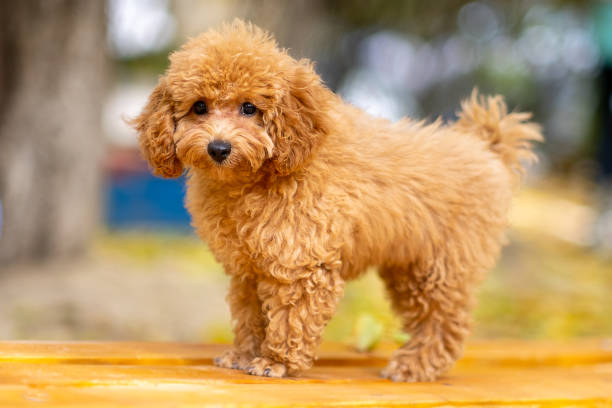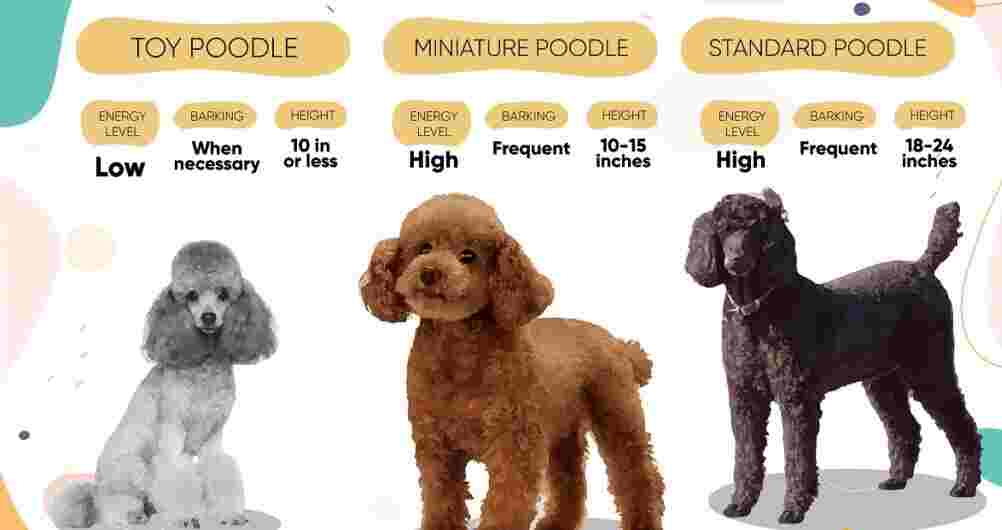Introduction
Full Grown Merle Toy Poodle is a great and special variation of the Poodle breed, famous for its beautiful coat pattern as well as for its sweet disposition. These dogs merge the typical features of the Toy Poodles, including intelligence, loyalty, and playfulness, with the distinctiveness of the merle coat. This comprehensive guide will walk you through all the information you would want to know about a full-grown Merle Toy Poodle-including its characteristics, temperament, care needs, health concerns, and more. Additionally, we are answering some commonly asked questions for you so you can really understand this captivating dog breed.

What is a Full-Grown Merle Toy Poodle?
A merle is actually the term that describes a coat pattern, which has a base color, usually gray or blue, and darker spots or patches interwoven throughout it. Merle dogs have an absolutely magnificent marbled coat. So, the Merle Toy Poodle inherits this beautiful pattern. In addition to the known sizes of Poodles – there are three recognized sizes: Standard, Miniature, and Toy – this merle coat pattern can appear in all three sizes.
However, the Merle Toy Poodle is especially loved because of its tiny, intelligent, and pretty appearance. A full-grown Merle Toy Poodle usually weighs between 4 to 6 pounds and stands 10 inches tall. They come in such a small size that makes them so good for apartment living, yet still demanding in the same care, attention, and exercise as their larger relatives.
Appearance of a Full-Grown Merle Toy Poodle
Coat
One of the most noted features of the Merle Toy Poodle is its coat. These dogs come with a curly, dense, and soft coat that mostly minimizes shedding; therefore, they are greatly in demand with allergy sufferers. This merle pattern imparts a marbled effect to their coat from lighter patches of the base color and darker patches mixed with gray, blue or silver, often interspersed with black, white, and cream. No two merle coats are alike; therefore, each dog will produce a totally different pattern. Some merle Toy Poodles also carry phantom markings (tan points) on the face, chest, or legs.
Size and Weight
Full-grown Merle Toy Poodles are miniature ones, measuring only about 9 to 10 inches tall at the shoulder and weighing 4 to 6 pounds. They are the smallest of the three Poodle sizes and, despite being dainty and compact, still require good care and attention to ensure health.
Eyes and Ears
Merle Toy Poodles commonly sport very striking eyes that can vary in color from blue, through amber, or even one of each color, a condition sometimes referred to as heterochromia. These eye colors are caused by the merle gene. They are floppy and long for the ears, like other Poodles, and soft, wavy fur adorns them.

Overall Appearance
With their small, athletic frame and unique merle-patterned coat, Merle Toy Poodles are incredibly eye-catching. Their alert expressions, intelligent eyes, and curly coat make them a sought-after breed for those looking for a dog that’s both adorable and distinctive.
Temperament of a Full-Grown Merle Toy Poodle
Intelligent and Trainable
Poodles, in general, are known for their great intelligence. Therefore, Merle Toy Poodles also share the same ability. In fact, they learn fast. They flourish in obedience training and agility as well as different kinds of dog sports. Their desire to please and be educated makes them great companion animals for a first-time dog owner. Training a Merle Toy Poodle can be an enjoyable time, rewarding after many practices, as they thrive on positive reinforcement, such as treats and praise.
Affectionate and Loyal
Merle Toy Poodles are affectionate and friendly dogs that just love to bond with their owners. They do well on attention, as well as companionship, as they will seek out their owners for cuddles and playtime. This loyalty makes them excellent family pets, and they can get along with the children and other pets in a household, provided they have been properly socialized. However, due to their small size, they can take improper handling by smaller children, so supervision is necessary.
Energetic and Playful
Merle Toy Poodles are highly energetic, even if small. The puppies love interactive play – with fetch, hide-and-seek, or puzzle toys. They do not need so much physical activity as big dogs, but they love daily exercise and mental stimulation. Keeping them busy with toys, activities, and training prevents boredom and keeps them happy and healthy.
Alert and Vigilant
Toy Poodles are also alert and very intelligent. For this reason, they make excellent watchdogs. A Merle Toy Poodle will typically alert the owners to unusual sounds or strangers. Being nonaggressive, their keen sense of awareness and vocality make them great protectors of the house.
Health Considerations
All breeds are susceptible to health concerns, and the Merle Toy Poodle is no exception. However, this breed is very healthy if well taken care of. Here are some potential health concerns:
1. **Progressive Retinal Atrophy (PRA)
Poodles, including the Merle Toy Poodle, can be at risk for PRA, a genetic disease that causes progressive degeneration of the retina. Eventually, it may result in blindness. Keep an eye out for any signs of eye problems and maintain regular veterinary checkups.
2. Hip Dysplasia
Even though hip dysplasia is less common in Toy Poodles than in larger breeds, it can still affect them. It’s a hereditary condition wherein the hip joint does not form normally, leading to discomfort and possible development of arthritis. Ensuring your dog is at the correct weight and regularly exercised helps reduce this risk.
3. Allergies
Like most small breed dogs, Merle Toy Poodles may have allergies, such as skin allergies or food sensitivities. Allergies can lead to itching, ear infection, or digestive problems. If you catch your dog scratching excessively or suffering from gastrointestinal issues, immediately seek veterinary advice on proper treatment.
4. **Dental Problems
Toy Poodles also are prone to dental issues because of their small mouth. They could get tartar build-up or gum disease; so, their teeth should be brushed regularly and they should be brought in for regular dental check-ups.
- Epilepsy
Epilepsy. This is another condition that might impact your Toy Poodles. Though relatively rare, seizures in some Merle Toy Poodles are very possible, so regular veterinary care can help manage this condition quite efficiently.

How to Care for a Full-Grown Merle Toy Poodle
Grooming the Coat
Grooming the Merle Toy Poodle requires keeping it extremely well maintained to maintain its exquisite look and to prevent matting. Here are a few grooming tips:
- Brushing: Brush the coat of Merle Toy Poodle often to avoid tangles and mats. Slicker brush is most suitable for this breed.
- Bathing: Bathe your Toy Poodle once in 4 to 6 weeks with a mild, hypoallergenic dog shampoo.
- Trimming: Poodles need regular haircuts for looking neat. Professional grooming is must every 6 to 8 weeks.
- Ear Care: Take time to inspect your dog’s ears for wax buildup or infection, since Poodles have floppy ears that tend to attract moisture.
- Nail Care: Keep trimming your dog’s nails regularly so they don’t grow too long and hurt them.
Diet and Nutrition
A balanced diet is essential to maintaining the health and longevity of your Merle Toy Poodle. Look for high-quality dog food formulated for small breeds, ensuring it provides the right balance of protein, fat, and carbohydrates. Always check the ingredient list and avoid foods with excessive fillers, artificial preservatives, or low-quality ingredients. Additionally, keep an eye on portion sizes to prevent obesity, which can exacerbate health problems.
Exercise and Mental Stimulation
Despite being small, Merle Toy Poodles are active and require regular exercise to stay healthy. Aim for 30 minutes to an hour of activity per day, including walks, playtime, and mental stimulation. Puzzle toys and training sessions can also provide important cognitive exercise.
Regular Vet Checkups
Routine vet visits will ensure that your Merle Toy Poodle is always healthy. Schedule annual checkups, vaccinations, and dental care in order to put your dog in the best condition. Also, monitor their weight and general health to catch anything problematic early.
Frequently Asked Questions
1. **What is a Merle Toy Poodle?
A Merle Toy Poodle is essentially a small dog that has the merle coat pattern. The merle coat pattern can be simply described as a marbled mixture of colors, usually with a blue-gray base and darker patches. The Toy Poodle is also the smallest variety of Poodles, weighing in at 4 to 6 pounds.
2. Are Merle Toy Poodles hypoallergenic?
Merle Toy Poodles are hypoallergenic. Their coat has a curly structure and is dense, which minimizes dander production, which is very suitable for allergy patients.
3. How big do Merle Toy Poodles get?
Merle Toy Poodles usually weigh about 4-6 pounds and reach up to 10 inches tall at the shoulder.
4. **How often do I have to groom my Merle Toy Poodle?
Merle Toy Poodles require extensive grooming. Brush their coat regularly at least two to three times a week, and bathe them every 4 to 6 weeks. Occasionally have them visit a professional groomer every 6 to 8 weeks for trimming and shaping.
5. What are the most common health problems in Merle Toy Poodles?
Common health problems in Merle Toy Poodles
Some of the health issues include Progressive Retinal Atrophy (PRA), hip dysplasia, allergies, dental issues, and sometimes epilepsy. These can be checked and managed by regular vet visits.
6. Merle Toy Poodles and children
Merle Toy Poodles are generally quite good with children. However, they should always be under supervision to prevent rough handling, which could be quite dangerous due to their small size.
7. Merle Toy Poodle exercise needs
A Merle Toy Poodle needs moderate exercise.
Merle Toy Poodles need at least 30 minutes of exercise every day, which comprises walking and playtime. Adequate mental stimulation by training and puzzle toys also helps keep them engaged.
8. How long do Merle Toy Poodles live?
Merle Toy Poodles are expected to live on average for 12 to 15 years. Some may live longer with good care.
9. What do I feed my Merle Toy Poodle?
Feed your Merle Toy Poodle high-quality, small-breed dog food. Avoid cheap fillers and artificial preservatives and additives, and look for foods with real meat as the first ingredient.
10. Are Merle Toy Poodles particularly challenging to train?
Merle Toy Poodles are a relatively easy breed to train. Intelligent and very eager to please, they respond well to positive reinforcement techniques, such as with treats, lots of praise, and play reward.
Conclusion
The Merle Toy Poodle is of small but exceptional stock, known for its beautiful coat, high intelligence, and affectionate nature. While they demand regular grooming and care, their playful and loyal character makes them the best friends of people and families. Providing the right amount of nutrition, exercise, and attention will give you years of happiness with your full-grown Merle Toy Poodle.

